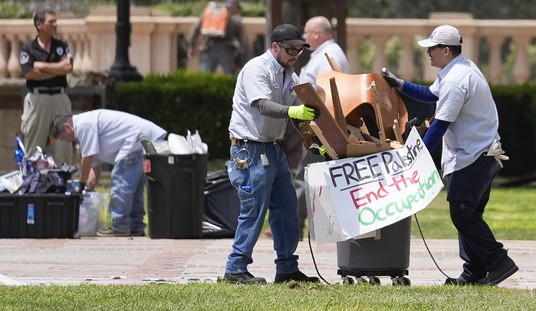The big news coming out of the talks between the White House and Republican lawmakers on an infrastructure bill is that the two sides are getting closer.
Not getting closer on how much, how long, or how Congress is going to pay for it. The two sides have almost come to an agreement on what infrastructure means. If you think that doesn’t sound like much progress at all, you win a cookie.
It remains to be seen how much longer the radical Democrats will sit still for this bipartisan nonsense.
House progressives sent their own warning shot Tuesday to Speaker Nancy Pelosi and Senate Majority Leader Chuck Schumer, arguing in a letter that Democrats should pursue a multitrillion-dollar megabill sweeping Biden’s priorities together, “a single, ambitious package combining physical and social investments hand in hand.” It’s the strongest sign yet that a growing number of liberals are done with trying to cut an infrastructure deal with Republicans that costs $800 billion at most and kicks other priorities down the road.
“They’re not being even players and we should just move on without them,” said Rep. Ruben Gallego (D-Ariz.), one of roughly 60 House liberals who signed the letter. He dismissed the GOP’s $800 billion plan as a “counting gimmick” rather than a serious proposal: “Time to pull the trigger.”
But Biden has a problem. At least two Democratic senators have said they will not vote for an infrastructure bill crafted solely by the Democrats. Senators Joe Manchin and Kyrsten Sinema are on the record stating that Republicans must be included. Manchin has gone so far as to say he won’t support another reconciliation bill that would require only 50 members and Vice President Harris to pass.
So “pulling the trigger” on a multi-trillion dollar infrastructure bill isn’t as easy as the radicals suppose.
Blunt said after the meeting that negotiators are still in the “talking stage” and are not yet making explicit offers. Sources of revenue that were discussed included public-private partnerships, as well as a charge on electric vehicles, he said. It’s unclear how those proposals would be sufficient to fund the huge spending figures under discussion. A fee on electric vehicles equivalent to the gas tax would only raise $1 billion over five years.
However, Capito said discussion of the gas tax is off the table.
Republicans aren’t even talking about the $4 trillion “jobs and family” plan when discussing ways to pay for it. They’re looking at their own more modest $500-800 billion plan and how to pay for that. They’re not even in the same ballpark to find that kind of money.
The White House has proposed paying for its $2 trillion infrastructure plan primarily by raising corporate taxes, which Republicans oppose. Instead, they’ve pushed alternative mechanisms, including unspecified user fees and using unspent money allocated for coronavirus relief.
Republican senators met with Commerce Secretary Gina Raimondo, Transportation Secretary Pete Buttigieg, White House Counselor Steve Ricchetti, Director of Legislative Affairs Louisa Terrell, and National Economic Council Director Brian Deese. The White House said the officials were “encouraged” by the conversation.
“User fees” would include a hike in the gasoline tax, despite what Senator Capito says, among other penny-ante proposals. The GOP better face the fact that they can either be the party of fiscal responsibility or not. And if they want to be fiscally responsible and have an infrastructure bill at the same time, they are going to have to walk the plank on taxes.
Republicans are totally comfortable in their hypocrisy on spending, so it’s not likely that any infrastructure deal will come close to being paid for.










Join the conversation as a VIP Member